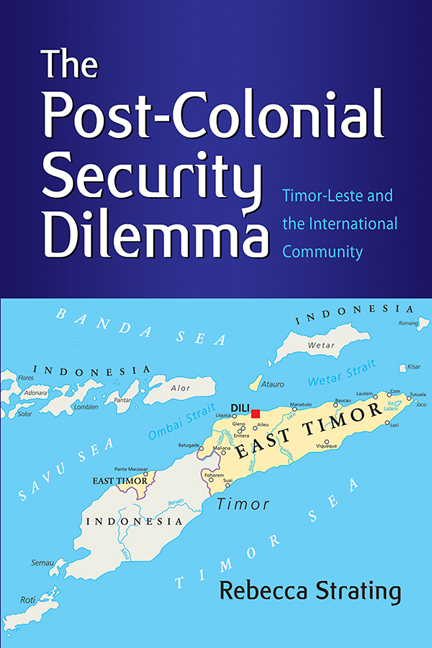Book contents
- Frontmatter
- Contents
- List of Tables
- Acknowledgements
- 1 Introduction
- 2 The Struggle for Recognition: Territorialization, Self-determination and the Imagining of “East Timor”
- 3 The Politics of Recognition: East Timor and the International Community
- 4 Establishing Legitimacy: International State-building in East Timor
- 5 Timor-Leste's Aspirational Foreign Policy
- 6 Identity Hedging: Timor-Leste's Engagement with Intergovernmental Organizations
- 7 Timor-Leste's National Security Agenda
- 8 Securing Economic Sovereignty
- 9 International Reconciliation and Transitional Justice
- 10 Conclusion: Timor-Leste in the Changing Regional Order
- Postscript
- Bibliography
- Index
- About the Author
3 - The Politics of Recognition: East Timor and the International Community
Published online by Cambridge University Press: 16 May 2019
- Frontmatter
- Contents
- List of Tables
- Acknowledgements
- 1 Introduction
- 2 The Struggle for Recognition: Territorialization, Self-determination and the Imagining of “East Timor”
- 3 The Politics of Recognition: East Timor and the International Community
- 4 Establishing Legitimacy: International State-building in East Timor
- 5 Timor-Leste's Aspirational Foreign Policy
- 6 Identity Hedging: Timor-Leste's Engagement with Intergovernmental Organizations
- 7 Timor-Leste's National Security Agenda
- 8 Securing Economic Sovereignty
- 9 International Reconciliation and Transitional Justice
- 10 Conclusion: Timor-Leste in the Changing Regional Order
- Postscript
- Bibliography
- Index
- About the Author
Summary
Sovereignty is an identity status that is bestowed upon political entities by sovereign states. The last chapter examined East Timor's rights to self-determination under international law. Whether individual states decide to recognize these claims to political independence is often motivated by political factors rather than legal principles. This chapter examines the reactions of states and members of the broader international community to the sovereign claims of the East Timorese independence movement. It examines some of the key states that contributed to denying — and then ultimately permitting — Timorese sovereignty. These include Australia, the ASEAN states, the United States and China, as well as the less influential but culturally significant groupings of Portuguese-speaking countries and Pacific Island States. For decades, East Timor's right to self-determination was denied as powerful states interpreted its claims within the context of their own national interests. At a system-level, Cold War power dynamics contributed to how states assessed their own geostrategic interests vis-à-vis Indonesia and East Timor. While many states refused to provide Indonesia de jure recognition of sovereignty over East Timor — a notable exception was Australia — Indonesia possessed de facto recognition as it was, in all practical senses, the administering power in East Timor. While East Timor's claims were legitimated by the United Nations General Assembly (UNGA), it was not provided the material support from the international community to make those rights meaningful.
There were two key challenges for East Timor achieving political legitimacy. The first related to convincing the international community that self-determination was a human rights issue. This entailed two elements: the first was the use of international liberal discourses to persuade Western states that East Timor's independence would be necessary to protect people from human rights violations by Indonesia. The second element involved constructing a vision of the type of state that East Timor would become — namely, a liberal democratic state that would defend the social, economic and civic rights of citizens according to international law. These normative appeals to liberal rights were ultimately successful in eroding the collective realpolitik that had sustained Indonesia's rule. At a system-level, the end of the Cold War compelled an increase in international pressure against human rights abuses during the 1990s.
- Type
- Chapter
- Information
- The Post-Colonial Security DilemmaTimor-Leste and the International Community, pp. 59 - 94Publisher: ISEAS–Yusof Ishak InstitutePrint publication year: 2018

